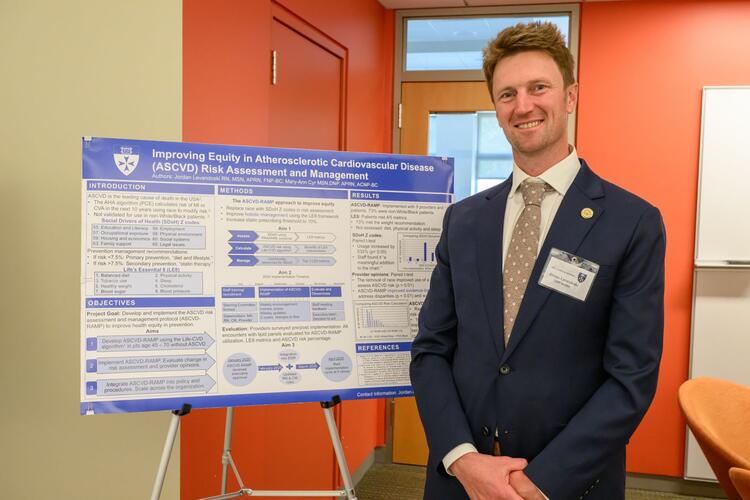By Christina Frank
Jordan Levandoski, MSN, APRN, FNP-BC, who is graduating this year from YSN’s Post-MSN Clinical Doctor of Nursing Practice (DNP) Program, wants to redefine how clinicians assess and manage cardiovascular risk. His first step: eliminate misleading race-based modifiers. The Clinical DNP program, designed for advanced practice nurses who want to enhance and innovate clinical care, helped Jordan build knowledge and expertise in this specialized clinical area to improve patient outcomes.
Levandoski’s DNP project, “Improving Equity in Atherosclerotic Cardiovascular Disease (ASCVD) Risk Assessment and Management,” focuses on removing race as a modifier in cardiovascular risk calculations for patients aged 45 to 75. The established ASCVD tool calculates a person’s risk of having a heart attack or stroke over the next 10 years. “If you say someone is Black, it increases the risk by 5 to 7 percent,” says Levandoski. “At 8 percent, you start prescribing people medication—even if they don’t have a disease.”
For many patients, statins are a good option to prevent ASCVD, but not in every situation. For some patients, Levandoski says it’s preferable to work on preventative lifestyle measures such as eating well, being more active, and quitting tobacco. Furthermore, the cost of prescription medications and follow-up lab testing can be prohibitive.
Levandoski became aware of the importance of the social drivers of health while working with Somalian and Burmese refugees as a nursing school student. “I realized homelessness, financial insecurity, language barriers, and food insecurity were impacting these patients’ ability to achieve good health, regardless of their culture and race,” he says. “What we do in the clinic only accounts for a very small portion of a person’s health. It made me start diving deeper into what race means in clinical decision support tools and systems.”
Students in the Clinical DNP program create an academic plan for ongoing clinical knowledge and skill development, providing a foundation for future dissemination of their expertise. Jordan’s scholarly inquiry focused on the impact of racial bias on clinical decision-making and health equity.
As part of his project, Levandoski combined the previously developed and validated PRAPARE screener, social drivers of health Z codes, Life’s Essential 8, and LIFE-CVD algorithms in a way that was meaningful to the providers to change practice at his clinic and across the Clinica Family Health and Wellness Organization, where he’s currently a nurse practitioner.
These codes help providers document patients’ social risk factors such as housing insecurity, education level, exposure to chemicals, and exposure to violence. Levandoski saw a 10,000 percent increase in the documentation of social systems risk, a 653 percent rise in housing and economic risk, and a 310 percent increase in education and literacy risk.
“Jordan is an excellent example of the impact of YSN’s Doctor of Nursing Practice degree on advanced practice nurses’ clinical outcomes,” said Professor and Program Director Joanne Iennaco, “I believe that programs like ours, for advanced practice nurses, are a critical component to help foster and disseminate the knowledge and skills of DNP-educated practitioners into clinical practice.”
The data was used to generate referrals to community-based services like SNAP-EBT programs, housing resources, and literacy initiatives. “We found a new calculator that did not have race in it, and that led to more primary prevention,” Levandoski says. “What really stood out was the way to adjust risk not by giving [people] drugs but trying to create partnerships with community organizations to adjust the root causes. Health is not the absence of disease; it’s quality of life. How do you live a good life despite everything around you?”
The initiative aligns with efforts on the part of the American Heart Association (AHA) and other national organizations to dismantle race-based clinical algorithms, an area in which Levandoski had already made an impact. While at Yale, he led national advocacy efforts through the Institute for Healing and Justice in Medicine, mobilizing academic institutions and clinicians to pressure the AHA to eliminate race from the ASCVD risk algorithm. In November 2023, the AHA released a new ASCVD risk algorithm called the PREVENT algorithm, which no longer includes race. “That was a huge victory,” Levandoski says.
Going forward, Levandoski will continue to use social drivers of health Z codes to support primary care and implement culturally inclusive interventions to empower health promotion in patients and communities.
Levandoski is one of 12 graduates of YSN’s Clinical Nursing Practice Program who will celebrate their accomplishments at this year’s commencement exercises.

